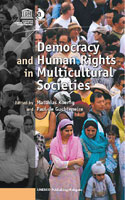| |
 |
 |
|
 |
 |
| Democracy and Human Rights in Multicultural Societies (La démocratie et les droits de l'homme dans les sociétés multiculturelles) |
 |
| Ce livre est disponible uniquement en anglais. |
Livres 1 de 2

 Order this book from UNESCO Publishing Order this book from UNESCO Publishing
By unanimous adoption of the Universal Declaration of Cultural Diversity, the UNESCO Member States accepted a new ethical approach to respect diversity as a guiding principle for democratic societies. While support for the Declaration remains strong, there is a general awareness that the democratic management of multicultural societies needs rethinking and further development.
This volume presents an important contribution to this debate. Democracy and Human Rights in Multicultural Societies examines the political governance of cultural diversity, specifically how public policy-making has dealt with the claims for cultural recognition that have increasingly been expressed by ethno-national movements, language groups, religious minorities, indigenous peoples and migrant communities. Its principle aim is to understand, explain and assess public policy responses to ethnic, linguistic and religious diversity. Adopting interdisciplinary perspectives of comparative social sciences, the contributors address the conditions, forms, and consequences of democratic and human-rights-based governance of multi-ethnic, multi-lingual and multi-faith societies.
Contents
Preface, Pierre Sané, UNESCO
Introduction
Part I Ethno-national Movements- Nationalism, ethnic conflict and democratic governance, Juan Díez-Medrano
- Nationalist extremism and outcomes of state policies in the Basque country, Enric Martínez-Herrera
- Conflict management in Northern Ireland, Stefan Wolff
- The decline of the PKK and the viability of a one-state solution in Turkey, Matthew Kocher
Part II Linguistic Diversity- Linguistic rights as an integral part of human rights - a legal perspective, Fernand de Varennes
- Protecting linguistic minorities - the role of the OSCE, Sally Holt and John Packer
- Language legislation in the Baltic states, Boris Cilevics
- Language rights in South Africa: an adequate level of minority protection?, Kristin Henrard
- The impact of language policy on endangered languages, Suzanne Romaine
Part III Religious Diversity
- The resurgence of religious movements in the processes of globalization, Shmuel N. Eisenstadt
- Modes of governing religious diversity under conditions of globalization, Ole Riis
- Management of religious diversity in England and Wales with special reference to prison chaplaincy, James A Beckford
- Governing religious diversity in post-Soviet Russia, Kathy Rousselet
Index
|
|
|
 |
 |
 Envoyer cette page Envoyer cette page  Version imprimable Version imprimable
|
 |
|
|


